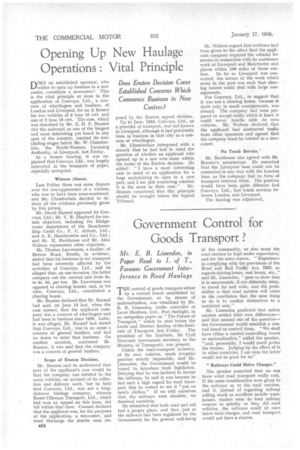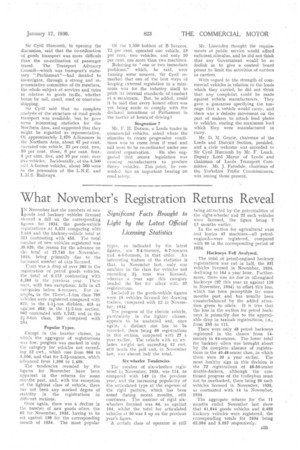Government Control for
Page 38

Page 39

If you've noticed an error in this article please click here to report it so we can fix it.
Goods Transport ?
Mr. E. B. Lissenden, in Paper Read to I. of T., Foresees Government Interference in Road Haulage
THE control of goods transport either by a central board established by the Government, or by means of nationalization, was visualized by Mr. E. B. Lissenden, traffic controller of Lever Brothers, Ltd., Port Sunlight, in an outspoken paper on "The Future of Transport," which he read before the Leeds and District Section of the Institute of Transport, last Friday. The president of the Institute, Sir Cyril Hurcomb (permanent secretary to the Ministry of Transport), was present.
Unless the road-transport industry, of its own volition, made irregular practice utterly impossible, said Mr. Lissenden, the Government would be bound to introduce fresh legislation. Denying that he was inclined to favour the railways, he said it was because he had such a high regard for road transport that he wished to see it "put on men's clothes." If we told ourselves that the railways were obsolete, we deceived ourselves.
He submitted that both road and rail had a proper place, and that, just as the railways had been regulated by the Government for the general well-being of the community, so also must the road carriers be kept under supervision, and for the same reason. "Experience in complying with the provisions of the Road and Rail Traffic Act, 1933, as regards driving hours, rest hours, etc.," said Mr. Lissenden, "goes to show that it is uneconomic, if not definitely risky, to travel far and wide, and the probability is that road carriers will come to the conclusion that the sane thing to do is to confine themselves to a restricted area."
Mr. Lissenden predicted that unless carriers settled their own differences-and that seemed out of the question—' the Government would establish a central board to control them. 'We shall have either a central controlling hoard . or nationalization," added the speaker, "and, personally, I would much prefer. the former. Judging by the effect of it in other countries, I am sure the latter' would not be good for us."
"Railways Could Halve Charges."
The speaker remarked that no one knew what road transport really cost. If the same consideration were given to the railways as to the road carriers, and if, instead of regarding railway rolling stock as excellent mobile warehouses, traders were to load railway wagons as quickly as they did road vehicles, the railways could. at once halve their charges, and road transport would not have a chance, Sir Cyril Hurcomb, in opening the discussion, said that the co-ordination of goods transport was more difficult than the co-ordination of passenger travel. The Transport Advisory Council—which was transport's statutory "Parliament"—had decided to investigate, through a strong and representative committee of its members, the whole subject of services and rates in relation to goods traffic, whether borne by rail, canal, road or coastwise shipping.
Sir Cyril said that no complete analysis of the structure of road goods transport was available, but he gave some interesting statistics for the Northern Area, and suggested that they might be regarded as representative. Of approximately 1,470 A-licensees in the Northern Area, about 47 per cent. operated one vehicle, 23 per cent. two, 10 per cent. three, 6 per cent. four, 4 per cent, five, and 10 per cent, over live vehicles, Incidentally, of the 4,54)0 odd A-licence vehicles, about 560 were in the possession of the L.N,E. and L.M.S. Railways. Of the 1,550 holders of B licences, 72 per cent, operated one vehicle, 18 per cent, two vehicles, and only 10 per cent. ran more than two machines.
Referring to "one or two immediate problems," which, he said, were causing some concern, Sir Cyril remarked that one of the best ways of keeping external regulation to a minimum was for the industry itself to pitch its internal standards of conduct at a maximum. But, he added, could it be said that every honest effort was yet being made to comply with the declared intentions of Parliament in the matter of hours of driving?
Stagnation ?
Mr. F. H. Dutson, a Leeds trader in commercial vehicles, asked where the stimulus to create progressive conditions was to come from if road and rail were to be co-ordinated under one
central organization. He also suggested that recent legislation was causing manufacturers to produce flimsy vehicles. This paint, he contended, has an important bearing on road safety.
Mr. Lissenden thought the requirements of public service would afford sufficient stimulus, and he did not think that any Government would be so foolish as to give a control board power to limit the activities of carriers as carriers.
With regard to the strength of commercial vehicles in relation to the loads which they carried, he did not think that any complaint could be made against vehicle manufacturers. They , gave a guarantee specifying the tonnage that a vehicle would carry, and there was a definite movement on the part of makers to attach load plates to vehicles, stating the maximum load which they were manufactured to carry.
Mr. D, 1VI, Gracie, chairman of the Leeds and District Section, presided, and a civic welcome was accorded to Sir Cyril Hurcomb by Mr. F. Leach, Deputy Lord Mayor of Leeds and chairman of Leeds Transport Committee. Mr. J. Farndale, chairman of the Yorkshire Traffic Commissioners, was among those present.




























































































